- Home
- Jack London
The Jacket (The Star-Rover) Page 2
The Jacket (The Star-Rover) Read online
Page 2
“To-night,” he told the Captain, “Summerface will bring in a dozen ’44 automatics. On his next time off he’ll bring in the ammunition. But to-night he’ll turn the automatics over to me in the bakery. You’ve got a good stool there. He’ll make you his report to-morrow.”
Now Summerface was a strapping figure of a bucolic guard who hailed from Humboldt County . He was a simple-minded, good-natured dolt and not above earning an honest dollar by smuggling in tobacco for the convicts. On that night, returning from a trip to San Francisco , he brought in with him fifteen pounds of prime cigarette tobacco. He had done this before, and delivered the stuff to Cecil Winwood. So, on that particular night, he, all unwitting, turned the stuff over to Winwood in the bakery. It was a big, solid, paper-wrapped bundle of innocent tobacco. The stool baker, from concealment, saw the package delivered to Winwood and so reported to the Captain of the Yard next morning.
But in the meantime the poet-forger’s too-lively imagination ran away with him. He was guilty of a slip that gave me five years of solitary confinement and that placed me in this condemned cell in which I now write. And all the time I knew nothing about it. I did not even know of the break he had inveigled the forty lifers into planning. I knew nothing, absolutely nothing. And the rest knew little. The lifers did not know he was giving them the cross. The Captain of the Yard did not know that the cross know was being worked on him. Summerface was the most innocent of all. At the worst, his conscience could have accused him only of smuggling in some harmless tobacco.
And now to the stupid, silly, melodramatic slip of Cecil Winwood. Next morning, when he encountered the Captain of the Yard, he was triumphant. His imagination took the bit in its teeth.
“Well, the stuff came in all right as you said,” the captain of the Yard remarked.
“And enough of it to blow half the prison sky-high,” Winwood corroborated.
“Enough of what?” the Captain demanded.
“Dynamite and detonators,” the fool rattled on. “Thirty-five pounds of it. Your stool saw Summerface pass it over to me.”
And right there the Captain of the Yard must have nearly died. I can actually sympathize with him—thirty-five pounds of dynamite loose in the prison.
They say that Captain Jamie—that was his nickname—sat down and held his head in his hands.
“Where is it now?” he cried. “I want it. Take me to it at once.”
And right there Cecil Winwood saw his mistake.
“I planted it,” he lied—for he was compelled to lie because, being merely tobacco in small packages, it was long since distributed among the convicts along the customary channels.
“Very well,” said Captain Jamie, getting himself in hand. “Lead me to it at once.”
But there was no plant of high explosives to lead him to. The thing did not exist, had never existed save in the imagination of the wretched Winwood.
In a large prison like San Quentin there are always hiding-places for things. And as Cecil Winwood led Captain Jamie he must have done some rapid thinking.
As Captain Jamie testified before the Board of Directors, and as Winwood also so testified, on the way to the hiding-place Winwood said that he and I had planted the powder together.
And I, just released from five days in the dungeons and eighty hours in the jacket; I, whom even the stupid guards could see was too weak to work in the loom-room; I, who had been given the day off to recuperate—from too terrible punishment—I was named as the one who had helped hide the non-existent thirty-five pounds of high explosive!
Winwood led Captain Jamie to the alleged hiding-place. Of course they found no dynamite in it.
“My God!” Winwood lied. “Standing has given me the cross. He’s lifted the plant and stowed it somewhere else.”
The Captain of the Yard said more emphatic things than “My God!” Also, on the spur of the moment but cold-bloodedly, he took Winwood into his own private office, looked the doors, and beat him up frightfully—all of which came out before the Board of Directors. But that was afterward. In the meantime, even while he took his beating, Winwood swore by the truth of what he had told.
What was Captain Jamie to do? He was convinced that thirty-five pounds of dynamite were loose in the prison and that forty desperate lifers were ready for a break. Oh, he had Summerface in on the carpet, and, although Summerface insisted the package contained tobacco, Winwood swore it was dynamite and was believed.
At this stage I enter or, rather, I depart, for they took me away out of the sunshine and the light of day to the dungeons, and in the dungeons and in the solitary cells, out of the sunshine and the light of day, I rotted for five years.
I was puzzled. I had only just been released from the dungeons, and was lying pain-racked in my customary cell, when they took me back to the dungeon.
“Now,” said Winwood to Captain Jamie, “though we don’t know where it is, the dynamite is safe. Standing is the only man who does know, and he can’t pass the word out from the dungeon. The men are ready to make the break. We can catch them red-handed. It is up to me to set the time. I’ll tell them two o’clock to-night and tell them that, with the guards doped, I’ll unlock their cells and give them their automatics. If, at two o’clock to-night, you don’t catch the forty I shall name with their clothes on and wide awake, then, Captain, you can give me solitary for the rest of my sentence. And with Standing and the forty tight in the dungeons, we’ll have all the time in the world to locate the dynamite.”
“If we have to tear the prison down stone by stone,” Captain Jamie added valiantly.
That was six years ago. In all the intervening time they have never found that non-existent explosive, and they have turned the prison upside-down a thousand times in searching for it. Nevertheless, to his last day in office Warden Atherton believed in the existence of that dynamite. Captain Jamie, who is still Captain of the Yard, believes to this day that the dynamite is somewhere in the prison. Only yesterday, he came all the way up from San Quentin to Folsom to make one more effort to get me to reveal the hiding-place. I know he will never breathe easy until they swing me off.
CHAPTER III
All that day I lay in the dungeon cudgelling my brains for the reason of this new and inexplicable punishment. All I could conclude was that some stool had lied an infraction of the rules on me in order to curry favour with the guards.
Meanwhile Captain Jamie fretted his head off and prepared for the night, while Winwood passed the word along to the forty lifers to be ready for the break. And two hours after midnight every guard in the prison was under orders. This included the day-shift which should have been asleep. When two o’clock came, they rushed the cells occupied by the forty. The rush was simultaneous. The cells were opened at the same moment, and without exception the men named by Winwood were found out of their bunks, fully dressed, and crouching just inside their doors. Of course, this was verification absolute of all the fabric of lies that the poet-forger had spun for Captain Jamie. The forty lifers were caught in red-handed readiness for the break. What if they did unite, afterward, in averring that the break had been planned by Winwood? The Prison Board of Directors believed, to a man, that the forty lied in an effort to save themselves. The Board of Pardons likewise believed, for, ere three months were up, Cecil Winwood, forger and poet, most despicable of men, was pardoned out.
Oh, well, the stir, or the pen, as they call it in convict argot, is a training school for philosophy. No inmate can survive years of it without having had burst for him his fondest illusions and fairest metaphysical bubbles. Truth lives, we are taught; murder will out. Well, this is a demonstration that murder does not always come out. The Captain of the Yard, the late Warden Atherton, the Prison Board of Directors to a man—all believe, right now, in the existence of that dynamite that never existed save in the slippery-geared and all too-accelerated brain of the degenerate forger and poet, Cecil Winwood. And Cecil Winwood still lives, while I, of all men concerned, the utterest, absoluti
st, innocentest, go to the scaffold in a few short weeks.
* * * * *
And now I must tell how entered the forty lifers upon my dungeon stillness. I was asleep when the outer door to the corridor of dungeons clanged open and aroused me. “Some poor devil,” was my thought; and my next thought was that he was surely getting his, as I listened to the scuffling of feet, the dull impact of blows on flesh, the sudden cries of pain, the filth of curses, and the sounds of dragging bodies. For, you see, every man was man-handled all the length of the way.
Dungeon-door after dungeon-door clanged open, and body after body was thrust in, flung in, or dragged in. And continually more groups of guards arrived with more beaten convicts who still were being beaten, and more dungeon-doors were opened to receive the bleeding frames of men who were guilty of yearning after freedom.
Yes, as I look back upon it, a man must be greatly a philosopher to survive the continual impact of such brutish experiences through the years and years. I am such a philosopher. I have endured eight years of their torment, and now, in the end, failing to get rid of me in all other ways, they have invoked the machinery of state to put a rope around my neck and shut off my breath by the weight of my body. Oh, I know how the experts give expert judgment that the fall through the trap breaks the victim’s neck. And the victims, like Shakespeare’s traveller, never return to testify to the contrary. But we who have lived in the stir know of the cases that are hushed in the prison crypts, where the victim’s necks are not broken.
It is a funny thing, this hanging of a man. I have never seen a hanging, but I have been told by eye-witnesses the details of a dozen hangings so that I know what will happen to me. Standing on the trap, leg-manacled and arm-manacled, the knot against the neck, the black cap drawn, they will drop me down until the momentum of my descending weight is fetched up abruptly short by the tautening of the rope. Then the doctors will group around me, and one will relieve another in successive turns in standing on a stool, his arms passed around me to keep me from swinging like a pendulum, his ear pressed close to my chest, while he counts my fading heart-beats. Sometimes twenty minutes elapse after the trap is sprung ere the heart stops beating. Oh, trust me, they make most scientifically sure that a man is dead once they get him on a rope.
I still wander aside from my narrative to ask a question or two of society. I have a right so to wander and so to question, for in a little while they are going to take me out and do this thing to me. If the neck of the victim be broken by the alleged shrewd arrangement of knot and noose, and by the alleged shrewd calculation of the weight of the victim and the length of slack, then why do they manacle the arms of the victim? Society, as a whole, is unable to answer this question. But I know why; so does any amateur who ever engaged in a lynching bee and saw the victim throw up his hands, clutch the rope, and ease the throttle of the noose about his neck so that he might breathe.
Another question I will ask of the smug, cotton-wooled member of society, whose soul has never strayed to the red hells. Why do they put the black cap over the head and the face of the victim ere they drop him through the trap? Please remember that in a short while they will put that black cap over my head. So I have a right to ask. Do they, your hang-dogs, O smug citizen, do these your hang-dogs fear to gaze upon the facial horror of the horror they perpetrate for you and ours and at your behest?
Please remember that I am not asking this question in the twelve-hundredth year after Christ, nor in the time of Christ, nor in the twelve-hundredth year before Christ. I, who am to be hanged this year, the nineteen-hundred-and-thirteenth after Christ, ask these questions of you who are assumably Christ’s followers, of you whose hang-dogs are going to take me out and hide my face under a black cloth because they dare not look upon the horror they do to me while I yet live.
And now back to the situation in the dungeons. When the last guard departed and the outer door clanged shut, all the forty beaten, disappointed men began to talk and ask questions. But, almost immediately, roaring like a bull in order to be heard, Skysail Jack, a giant sailor of a lifer, ordered silence while a census could be taken. The dungeons were full, and dungeon by dungeon, in order of dungeons, shouted out its quota to the roll-call. Thus, every dungeon was accounted for as occupied by trusted convicts, so that there was no opportunity for a stool to be hidden away and listening.
Of me, only, were the convicts dubious, for I was the one man who had not been in the plot. They put me through a searching examination. I could but tell them how I had just emerged from dungeon and jacket in the morning, and without rhyme or reason, so far as I could discover, had been put back in the dungeon after being out only several hours. My record as an incorrigible was in my favour, and soon they began to talk.
As I lay there and listened, for the first time I learned of the break that had been a-hatching. “Who had squealed?” was their one quest, and throughout the night the quest was pursued. The quest for Cecil Winwood was vain, and the suspicion against him was general.
“There’s only one thing, lads,” Skysail Jack finally said. “It’ll soon be morning, and then they’ll take us out and give us bloody hell. We were caught dead to rights with our clothes on. Winwood crossed us and squealed. They’re going to get us out one by one and mess us up. There’s forty of us. Any lyin’s bound to be found out. So each lad, when they sweat him, just tells the truth, the whole truth, so help him God.”
And there, in that dark hole of man’s inhumanity, from dungeon cell to dungeon cell, their mouths against the gratings, the two-score lifers solemnly pledged themselves before God to tell the truth.
Little good did their truth-telling do them. At nine o’clock the guards, paid bravoes of the smug citizens who constitute the state, full of meat and sleep, were upon us. Not only had we had no breakfast, but we had had no water. And beaten men are prone to feverishness. I wonder, my reader, if you can glimpse or guess the faintest connotation of a man beaten—“beat up,” we prisoners call it. But no, I shall not tell you. Let it suffice to know that these beaten, feverish men lay seven hours without water.
At nine the guards arrived. There were not many of them. There was no need for many, because they unlocked only one dungeon at a time. They were equipped with pick-handles—a handy tool for the “disciplining” of a helpless man. One dungeon at a time, and dungeon by dungeon, they messed and pulped the lifers. They were impartial. I received the same pulping as the rest. And this was merely the beginning, the preliminary to the examination each man was to undergo alone in the presence of the paid brutes of the state. It was the forecast to each man of what each man might expect in inquisition hall.
I have been through most of the red hells of prison life, but, worst of all, far worse than what they intend to do with me in a short while, was the particular hell of the dungeons in the days that followed.
Long Bill Hodge, the hard-bitten mountaineer, was the first man interrogated. He came back two hours later—or, rather, they conveyed him back, and threw him on the stone of his dungeon floor. They then took away Luigi Polazzo, a San Francisco hoodlum, the first native generation of Italian parentage, who jeered and sneered at them and challenged them to wreak their worst upon him.
It was some time before Long Bill Hodge mastered his pain sufficiently to be coherent.
“What about this dynamite?” he demanded. “Who knows anything about dynamite?”
And of course nobody knew, although it had been the burden of the interrogation put to him.
Luigi Polazzo came back in a little less than two hours, and he came back a wreck that babbled in delirium and could give no answer to the questions showered upon him along the echoing corridor of dungeons by the men who were yet to get what he had got, and who desired greatly to know what things had been done to him and what interrogations had been put to him.
Twice again in the next forty-eight hours Luigi was taken out and interrogated. After that, a gibbering imbecile, he went to live in Bughouse Alley. He has a strong co
nstitution. His shoulders are broad, his nostrils wide, his chest is deep, his blood is pure; he will continue to gibber in Bughouse Alley long after I have swung off and escaped the torment of the penitentiaries of California.
Man after man was taken away, one at a time, and the wrecks of men were brought back, one by one, to rave and howl in the darkness. And as I lay there and listened to the moaning and the groaning, and all the idle chattering of pain-addled wits, somehow, vaguely reminiscent, it seemed to me that somewhere, some time, I had sat in a high place, callous and proud, and listened to a similar chorus of moaning and groaning. Afterwards, as you shall learn, I identified this reminiscence and knew that the moaning and the groaning was of the sweep-slaves manacled to their benches, which I heard from above, on the poop, a soldier passenger on a galley of old Rome. That was when I sailed for Alexandria , a captain of men, on my way to Jerusalem . . . but that is a story I shall tell you later. In the meanwhile . . . .
CHAPTER IV
In the meanwhile obtained the horror of the dungeons, after the discovery of the plot to break prison. And never, during those eternal hours of waiting, was it absent from my consciousness that I should follow these other convicts out, endure the hells of inquisition they endured, and be brought back a wreck and flung on the stone floor of my stone-walled, iron-doored dungeon.
They came for me. Ungraciously and ungently, with blow and curse, they haled me forth, and I faced Captain Jamie and Warden Atherton, themselves arrayed with the strength of half a dozen state-bought, tax-paid brutes of guards who lingered in the room to do any bidding. But they were not needed.
“Sit down,” said Warden Atherton, indicating a stout arm-chair.
I, beaten and sore, without water for a night long and a day long, faint with hunger, weak from a beating that had been added to five days in the dungeon and eighty hours in the jacket, oppressed by the calamity of human fate, apprehensive of what was to happen to me from what I had seen happen to the others—I, a wavering waif of a human man and an erstwhile professor of agronomy in a quiet college town, I hesitated to accept the invitation to sit down.

 The Son of the Wolf
The Son of the Wolf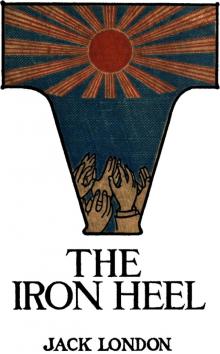 The Iron Heel
The Iron Heel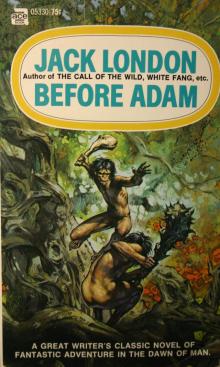 Before Adam
Before Adam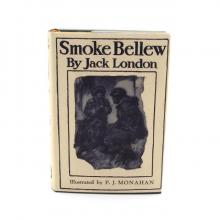 Smoke Bellew
Smoke Bellew The Call of the Wild
The Call of the Wild The Valley of the Moon Jack London
The Valley of the Moon Jack London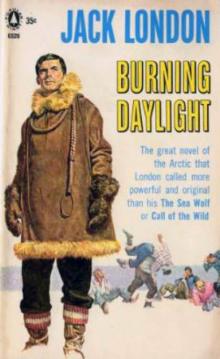 Burning Daylight
Burning Daylight The Sea Wolf
The Sea Wolf White Fang
White Fang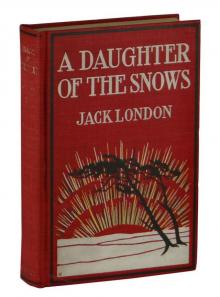 A Daughter of the Snows
A Daughter of the Snows The Night-Born
The Night-Born A Son Of The Sun
A Son Of The Sun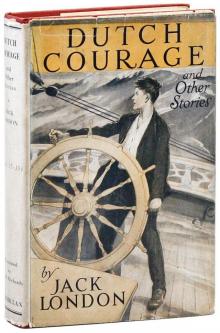 Dutch Courage and Other Stories
Dutch Courage and Other Stories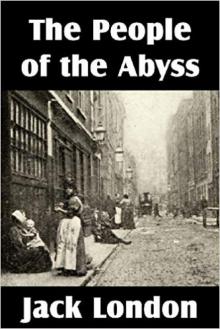 The People of the Abyss
The People of the Abyss Michael, Brother of Jerry
Michael, Brother of Jerry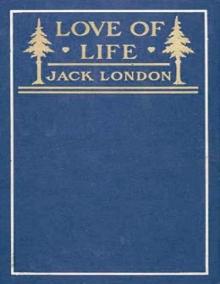 Love of Life, and Other Stories
Love of Life, and Other Stories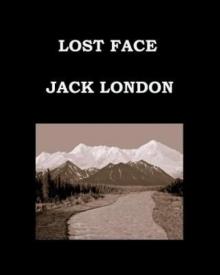 Lost Face
Lost Face The Road
The Road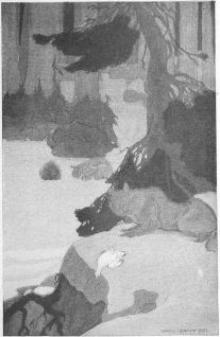 Love of Life
Love of Life The Turtles of Tasman
The Turtles of Tasman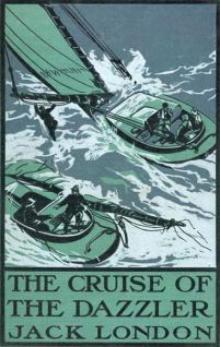 The Cruise of The Dazzler
The Cruise of The Dazzler The Heathen
The Heathen The Scab
The Scab The Faith of Men
The Faith of Men Adventure
Adventure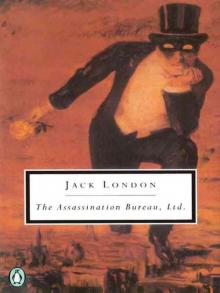 The Assassination Bureau, Ltd.
The Assassination Bureau, Ltd. The Call of the Wild, White Fang, and Other Stories
The Call of the Wild, White Fang, and Other Stories The Call of the Wild and Selected Stories
The Call of the Wild and Selected Stories Jerry of the Islands
Jerry of the Islands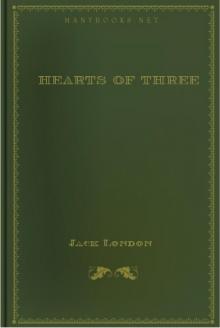 Hearts of Three
Hearts of Three The House of Pride
The House of Pride Moon-Face and Other Stories
Moon-Face and Other Stories Children of the Frost
Children of the Frost South Sea Tales
South Sea Tales The Strength of the Strong
The Strength of the Strong The Jacket (The Star-Rover)
The Jacket (The Star-Rover) The Little Lady of the Big House
The Little Lady of the Big House John Barleycorn
John Barleycorn ADaugter of Snows
ADaugter of Snows The Mutiny of the Elsinore
The Mutiny of the Elsinore Northland Stories
Northland Stories Tales of the Fish Patrol
Tales of the Fish Patrol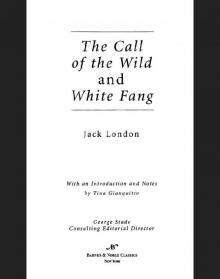 Call of the Wild and White Fang (Barnes & Noble Classics Series)
Call of the Wild and White Fang (Barnes & Noble Classics Series) The Valley of the Moon
The Valley of the Moon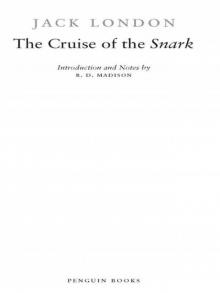 The Cruise of the Snark
The Cruise of the Snark The Game
The Game An Autobiography of Jack London
An Autobiography of Jack London